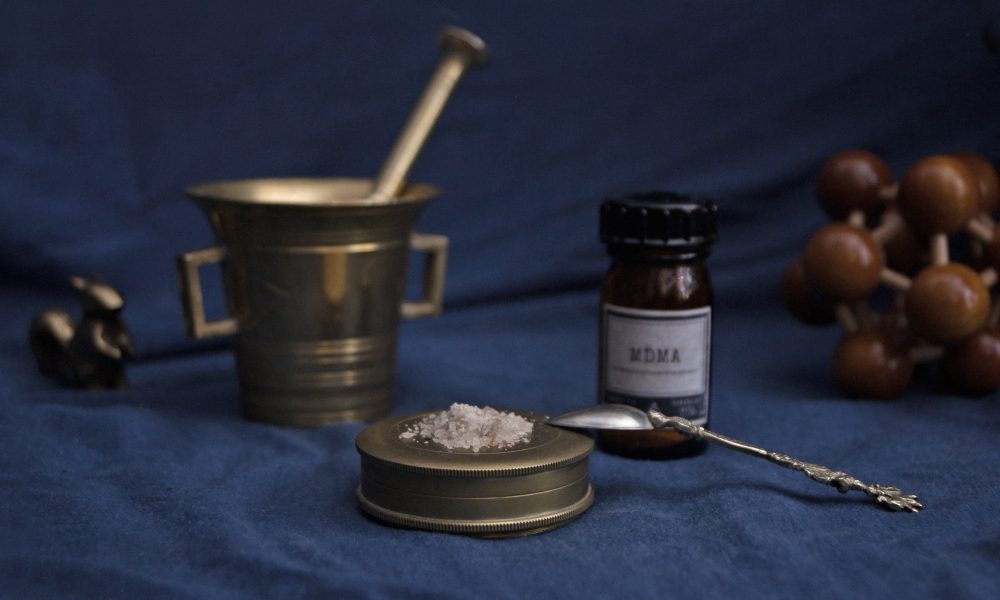The U.S. Department of Veterans Affairs (VA) has announced that it’s providing $1.5 million in funding to study the efficacy of MDMA-assisted therapy for veterans with post-traumatic stress disorder (PTSD) and alcohol use disorder (AUD).
This marks the first agency-funded psychedelics study since the 1960s, with the grant being awarded to VA researchers affiliated with Brown University and Yale University. The clinical trial will take place at Providence VA Medical Center and West Haven VA Medical Center. Enrollment is expected to begin next year.
VA Under Secretary for Health Shereef Elnahal previewed the research initiative in October during a panel that also featured Sen. Kyrsten Sinema (I-AZ) and Rep. Morgan Luttrell (R-TX), who have separately advocated for psychedelics reform.
“VA is on the cutting edge of clinical research for Veteran health, including in the investigation of psychedelics for mental health,” Elnahal said in a press release on Tuesday. “This study will give us better insight into the potential of MDMA-assisted therapy as a treatment for Veterans.”
🚨VA is launching its first VA-funded psychedelic-assisted therapy study for veterans, targeting new treatments for PTSD and alcohol use disorder.
Interested veterans can find details and participation information at: https://t.co/5MIZO5wfSG
— House Veterans’ Affairs Democrats (@VetAffairsDems) December 3, 2024
Veterans selected to participate in the study will be administered MDMA, with a placebo group receiving a lower dose to account for what Elnahal previously described as “functional unblinding” that could bias the results.
VA also stressed that the department “strongly discourages self-medicating with psychedelics or any other unprescribed substances,” despite the potential promise of the novel therapies.
Earlier this year, Rachel Yehuda, director of mental health at VA’s James J. Peters Veterans Affairs Medical Center, touted an initial study the agency funded that produced “stunning and robust results” from its first-ever clinical trial into MDMA therapy.
This comes as the Food and Drug Administration (FDA) faces criticism from advocates and researchers after denying an application to approve MDMA-assisted therapy for PTSD based on separate research.
Just one day before FDA declined to approve a new drug application for MDMA-assisted therapy, Yehuda said she’s been asked how that decision might affect the department’s own work. She said the answer is: “Double down on the research. Keep generating the data and the cases. The nature of challenge is, well, that it is challenging. But I am optimistic.”
Bipartisan lawmakers separately staged an event at the U.S. Capitol calling for the MDMA approval by FDA and also launched an art installation memorializing military veterans who died by suicide.
Meanwhile, the U.S. House of Representatives recently approved amendments to a large-scale spending bill that would authorize VA doctors to issue medical marijuana recommendations to military veterans and support psychedelics research and access.
In August, the Senate Appropriations Committee also passed report language for appropriations legislation conveying concerns about restrictions on marijuana and psychedelics research imposed by current prohibition.
Separately, advocates in support of expanding access to psychedelic-assisted therapy for America’s military veterans released an informational guidebook in October that backers say “responds to the demand for alternative treatment solutions and equips veterans with practical, clinically-backed strategies to safely explore these therapies.”
It’s unclear how VA’s own work on psychedelics research will be impacted under the incoming Trump administration.
President-elect Donald Trump recently announced his intent to nominate former Rep. Doug Collins (R-GA) to head up VA—a choice that raises questions about how the agency might navigate marijuana issues given his prior record of voting against medical cannabis access for military veterans during his time in Congress.
Before last month’s election, Vice President-elect JD Vance said he was “fascinated” by the therapeutic potential of psychedelics, asking podcaster Joe Rogan for advice on a creating a possible “pathway” for providing access to substances such as MDMA and psilocybin for military veterans with serious mental health conditions.
Photo courtesy of Pretty Drugthings on Unsplash.

